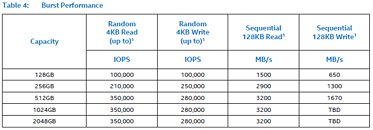- Joined
- Oct 9, 2007
- Messages
- 47,895 (7.38/day)
- Location
- Dublin, Ireland
| System Name | RBMK-1000 |
|---|---|
| Processor | AMD Ryzen 7 5700G |
| Motherboard | Gigabyte B550 AORUS Elite V2 |
| Cooling | DeepCool Gammax L240 V2 |
| Memory | 2x 16GB DDR4-3200 |
| Video Card(s) | Galax RTX 4070 Ti EX |
| Storage | Samsung 990 1TB |
| Display(s) | BenQ 1440p 60 Hz 27-inch |
| Case | Corsair Carbide 100R |
| Audio Device(s) | ASUS SupremeFX S1220A |
| Power Supply | Cooler Master MWE Gold 650W |
| Mouse | ASUS ROG Strix Impact |
| Keyboard | Gamdias Hermes E2 |
| Software | Windows 11 Pro |
Earlier this week, we broke the story of Intel giving finishing touches to its new SSD 7-series 760p and 660p NVMe drives. Newer screenshots scored by Tom's Hardware put out the company's performance numbers for each of the five 760p series models, 128 GB, 256 GB, 512 GB, 1 TB, and 2 TB. The 128 GB variant is the slowest, and its numbers are the territory of the slower 660p series - up to 1500 MB/s sequential reads, with up to 650 MB/s sequential writes; and 4K random access numbers of up to 100,000 IOPS (both reads and writes).
The 256 GB variant is where the 760p really begins to come to life. With up to 2900 MB/s sequential reads, and up to 1300 MB/s sequential writes, this model begins to make use of the 32 Gb/s PCIe interface. Its 4K random access performance is rated at up to 210,000 IOPS reads, with up to 250,000 IOPS writes. The 512 GB, 1 TB, and 2 TB models have near-identical performance numbers, which are the speeds Intel vaguely advertises for the entire series. The three have the same sequential read speeds of up to 3200 MB/s, and 4K random access performance of up to 350,000/280,000 IOPS (reads/writes). The company didn't put out sequential write numbers of the 1 TB and 2 TB models. Intel reportedly launches the 760p some time early-February.

View at TechPowerUp Main Site
The 256 GB variant is where the 760p really begins to come to life. With up to 2900 MB/s sequential reads, and up to 1300 MB/s sequential writes, this model begins to make use of the 32 Gb/s PCIe interface. Its 4K random access performance is rated at up to 210,000 IOPS reads, with up to 250,000 IOPS writes. The 512 GB, 1 TB, and 2 TB models have near-identical performance numbers, which are the speeds Intel vaguely advertises for the entire series. The three have the same sequential read speeds of up to 3200 MB/s, and 4K random access performance of up to 350,000/280,000 IOPS (reads/writes). The company didn't put out sequential write numbers of the 1 TB and 2 TB models. Intel reportedly launches the 760p some time early-February.

View at TechPowerUp Main Site




